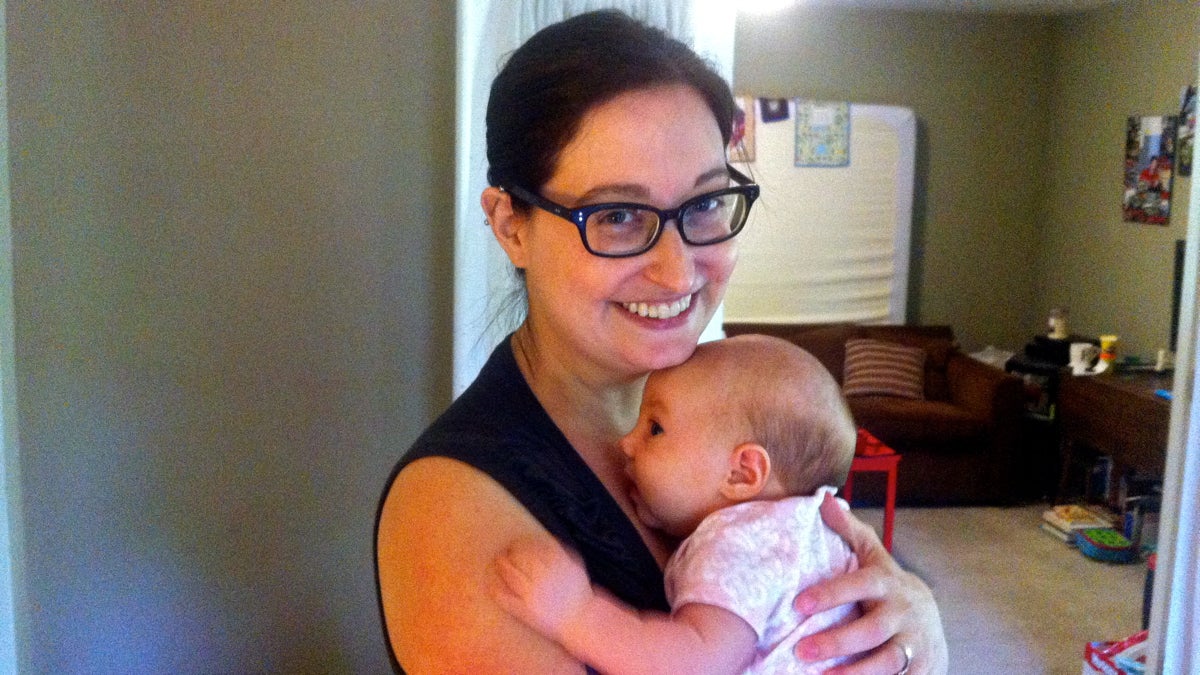Should digital health records include mental health?
Listen
Dr. Erica Goldblatt Hyatt is a professor of psychology at Bryn Athyn College in Pennsylvania. She also suffers with obsessive compulsive disorder. (Maiken Scott/WHYY)
Different providers are following different paths.
The medical field has been notoriously slow to embrace technology when it comes to patients’ health records.
The Affordable Care Act brought a $30 billion cash infusion from the federal government that has helped move things along – now about 70 percent of American medical files are digitized.
This development has meant many new questions – among them, what to do with people’s mental health records. Should they be part of the equation? Kept separately? As with many other aspects of this issue – different providers are following different paths.
Going all in
At the Philadelphia VA, David Oslin is staring at his computer, looking for details in a medical record. He is a psychiatrist, and chief of behavioral health at the facility, and when the VA went digital with its health records years ago, they decided to go all in – with combined mental and physical health info. Depression, addiction, diabetes, it’s all there, for every physician and provider within the VA system to see.
Oslin says this approach is working well, and has resulted in better care. “It’s really important that health care be delivered by a community of providers, right? So a primary care doctor would not be making a decision about medications not knowing what medications I’m prescribing,”
The medical records become part of Oslin’s sessions with vets – he looks at them to assess the veteran’s overall health. “If I’m treating somebody for depression, and they are not managing their diabetes, we know that these things interplay,” he explained.
Or, if he’s treating a veteran with alcohol abuse issues, he’ll show them how their liver is doing, and as a way of saying – it’s important to stay sober.
Not all mental health providers are as excited about integrated records as Oslin – he says many are worried patients with a mental health diagnosis will be treated differently by other providers, and feel it’s a violation of their patients’ privacy around very sensitive issues.
“And I think, in a lot of ways, from my perspective, it contributes to the stigma, right? It contributes to the lack of a dialogue with the other healthcare providers for that patient”
Oslin says vets don’t tend to mind the open approach to their records. If they have questions about it, he says, he explains that it’s basically just everybody working together – on one team.
“Oh and by the way, veterans have full access to those records too, and that’s important, and that’s been a transformation in most of healthcare, too,” he added.
Different hospital, different choices
Right now, medical records don’t “talk to each other” from system to system, so a doctor at Jefferson can’t see any notes relating to treatment a patient has gotten at Temple, or Penn. So any decisions made in regards to including mental health records, or not, will only affect patient care within one provider system.
Other health systems are more cautious about including mental health records into patients’ electronic files. At Einstein Healthcare Network in Philadelphia, chief medical information officer Julie Massey is glued to her computer, trying to get all of Einstein’s providers and practices connected. Actually, she’s doctor Julie Massey.
“I’m a pediatrician by training, then moved into the IT world, bridging the gap between clinicians and IT.”
This is a new specialty – there’s now a board certification for clinical informatics – for physicians to bring the clinical voice into digital health records. Massey’s current task is massive, and far from done.
“We’re just beginning a number of the discussions on how to find the right balance between privacy and access to information for some of our mental health patients,” she said.
Right now, Einstein is opting for limited access.
“So there is some minimal information, including diagnosis and medications that is available to other clinicians, the therapy information we do have capability to protect specific, sensitive information, that’s only to appropriate relevant clinicians.”
Meaning, only mental health providers can see details from a person’s history – past trauma or abuse, or what they said in a therapy session. Massey says this allows everybody to check for potential medication interactions, but protects patients’ privacy.
Telling your own story, rather than becoming a name on a file
This limited access approach appeals to psychologist Erica Goldblatt Hyatt. She teaches at Bryn Athyn College, and has worked as a mental health provider in hospital settings.
“I think I’m of two minds about it, on the one hand, as a provider, it’s certainly convenient to have your patient’s story written out for you,” she said.
But – she also has a diagnosis of OCD, and as a mental health care consumer, she sees things differently.
“Part of the therapeutic relationship is allowing the patient to tell their story of illness from their own words,” she said.
For example, if a primary care doctor sees the OCD diagnosis right away, as soon as they click on Goldblatt Hyatt’s medical records – that doctor might make assumptions about her, or treat her differently. This concept is known as overshadowing.
“Serious medical conditions are overlooked because one thinks that the patient is overreacting, or this is part of their mental illness when in fact it’s a serious illness,” explained U Penn medical ethicist Dominic Sisti. He added that for some people, having their mental illness diagnosis be known could result in an inability to find physicians for unrelated medical conditions.
“I have been looking at Borderline Personality Disorder, and it turns out physicians are very hesitant to treat these individuals, because they are perceived as very difficult patients. So mental health care providers are sometimes in a difficult position, where they have refrained from documenting this disorder in the chart, for fear that other providers would be hesitant to treat them.”
Erica Goldblatt Hyatt says in addition to those fears, mental health issues are unique – they are harder to define, it’s tough to put them into neat categories.
“I can’t tell you my heart’s story from my heart’s point of view, other than to look at pathology or samples or to look at labs,” she said. “But I can tell you what it feels like to have OCD, I can tell you what intrusive thoughts feel like and how they affect my life, and when I’m using my own words, and I make those choices with my narrative, it feels empowering.”
Right now, Goldblatt Hyatt is in need of a new primary care doctor. She could get her lengthy paper files transferred from the old office to the new one. But, she’s thinking of not doing that:
“I want my new provider to hear the story, so why not start from scratch,” she said with a laugh.
Letting your paper medical records rot away in a closet won’t be an option in the future – and many providers and consumers say it’s time for mental health care to come out of its silo.
But the push for more integrated care will require a paradigm shift in healthcare that has yet to take root.
WHYY is your source for fact-based, in-depth journalism and information. As a nonprofit organization, we rely on financial support from readers like you. Please give today.




